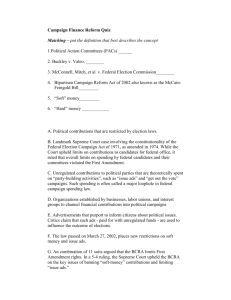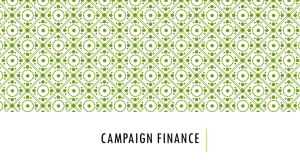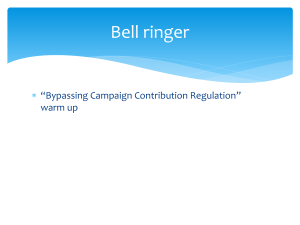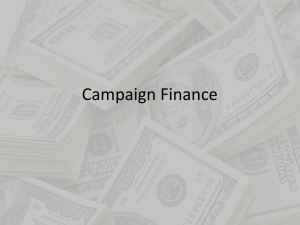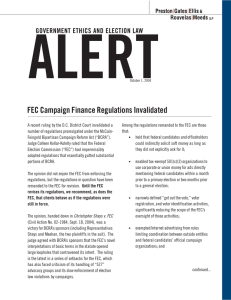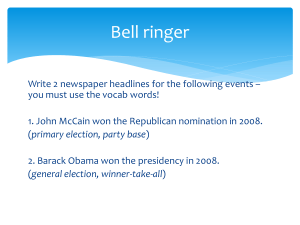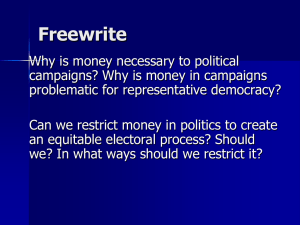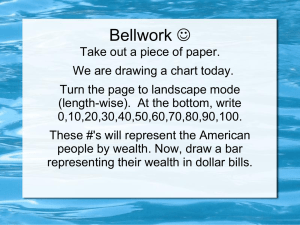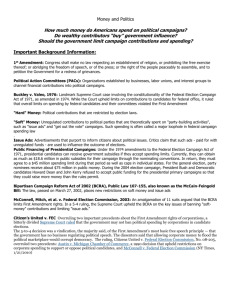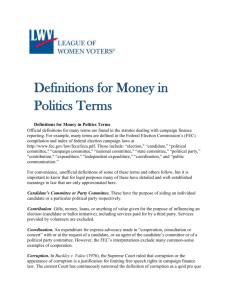Lobbying & Campaign Finance Reform
advertisement
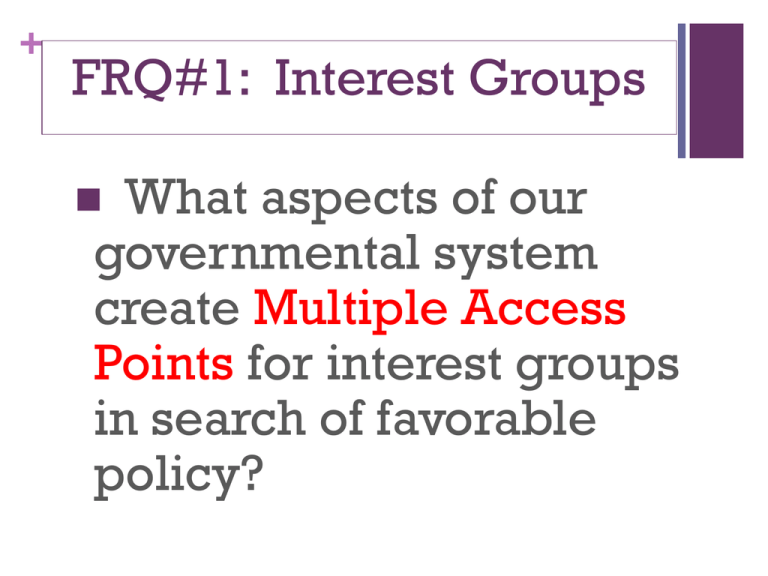
+ FRQ#1: Interest Groups What aspects of our governmental system create Multiple Access Points for interest groups in search of favorable policy? + 1) Separation of Powers Favorable policy outcomes Interes t Groups LOBBYING! • Seek favorable legislation. Congress • Ask for oversight hearings on implementation. • Ask pres. to sign/veto bills. President & Bureaucracy Federal Courts • Lobby federal agencies for favorable regulations. • Ask president to issue executive orders. • File lawsuits. • Submit amicus curiae briefs. + 2) Federalism Interest Groups State Legislatures and various local law-making boards/councils State Governors and various state/local agencies State Court Systems + 3) Frequency of Elections 2012 2013 Initiative • State/local and Referendum • Primary (spring) 2014 • Midterms • General (November) 2015 • Presidential • Primary (spring) • General (November) • State/local At least 6 elections every 4-year cycle. + FRQ#2: Campaign Finance Reform + A. 1970s – Federal Election Campaign Acts (FECA) Imposed rules and regulations on fundraising practices of candidates. Created the Federal Election Commission (FEC) to act as a watchdog and enforce rules. Required Interest Groups to form Political Action Committees (PACs) if they want to donate to campaigns. + A. 1970s – Federal Election Campaign Acts (FECA) Established limits on “hard money” contributions. Individual Candidate $1000 (primary) $1000 (general election) + A. 1970s – Federal Election Campaign Acts (FECA) Interest Group (PAC) Candidate $5000 (primary) $5000 (general election) Purpose of FECA: Make candidates get lots of small contributors instead of just a few big ones. + A. 1970s – Federal Election Campaign Acts (FECA) Loopholes: Political 1) Individual “Soft Money” Parties. (unlimited $$$ if given for “party building activities”) (“Issue Ads”) 2) Rich Individual candidate. (unlimited spending on own campaign.) Buckley v. Valeo (1976) 3) Independent Expenditure Ads. “Free Speech” (unlimited spending if not coordinated with any individual campaigns.) + B. McCain-Feingold Act (2002) Formal Name: Bipartisan Campaign Reform Act (BCRA) Individual Candidate $2000/primary $2000/general election (Indexed for inflation.) + B. McCain-Feingold Act (2002) 1) Individual $ 25,000/year Political Party (indexed for inflation) 2) Millionaire’s Amendment. Higher contribution limits for opponents of rich, self-funded candidates. + B. McCain-Feingold Act (2002) 3) Blackout periods on Independent Ads: -- 30 days before primary. -- 60 days before general election. (Only “hard money” ads allowed – “Stand by your ad” provision.) + C. Court challenges to BCRA McConnell v. FEC (2003). 5-4 decision upholding BCRA. (w/ Sandra Day O’Connor as swing vote.) + C. Court challenges to BCRA Roberts/Alito Court: FEC v. WRTL (2007). Davis v. FEC (2008). Citizen’s United v. FEC (2010). RNC v. FEC (2014) (pending). + + +
